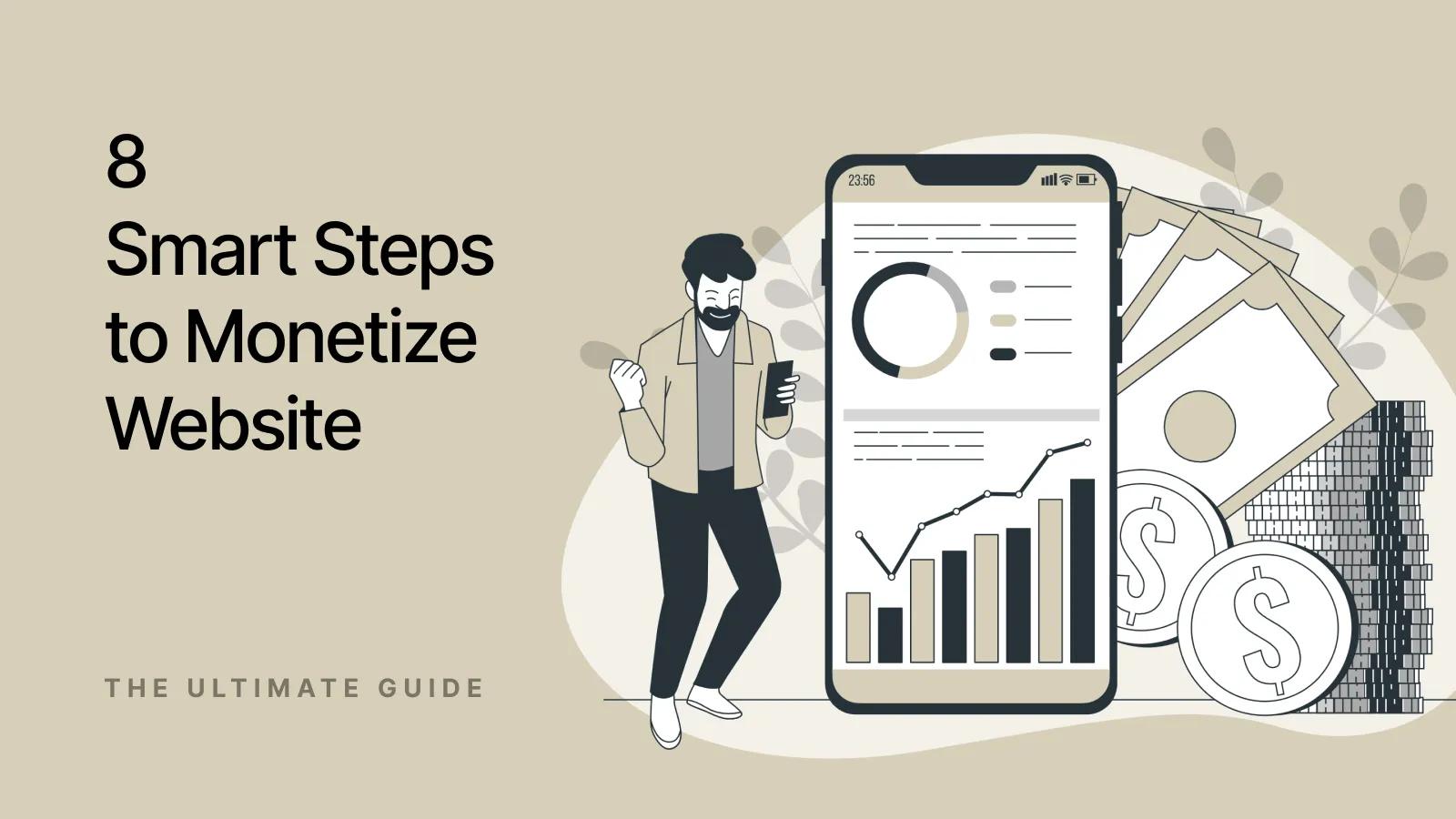It’s not a huge secret that the online world has evolved, and there are now even more innovative and effective ways to monetize your website. Whether you are a blogger, content creator, or business owner, the opportunities to generate revenue from your website have expanded significantly from traditional methods like display ads and affiliate marketing to leveraging cutting-edge digital assets.
All of these monetization methods bring a lot of profit opportunities for website owners. And if you leverage the traffic that joins to enjoy their time on your website, you can expect to earn a lot of money. On average, you can make around $1,000 by featuring ads on your website. Or, if you operate with donations, you can expect to bank about $800.
Either way, the possibilities are endless. In this blog post, we will explore innovative ways to monetize your website in 2023, helping you stay ahead of the curve and capitalize on the latest trends in website monetization.
So, sit back and get ready to unlock new revenue streams and take your website monetization game to the next level.
A Simple Overview of Website Monetization in 2023
2023 looks to be an exciting year for website monetization, with new technologies and cutting-edge strategies allowing website owners to maximize their revenue potential. It’s needless to say that the online advertising industry has made tremendous progress over the last few years, impacting how website owners monetize their sites.
Popular forms of monetization, such as affiliate marketing, sponsored content, and subscription models, will always be viable ways for website owners to generate revenue. Still, emerging trends like artificial intelligence, for example, offer more sophisticated approaches. These technologies can be used to create personalized experiences for visitors and provide more targeted advertising opportunities.
Additionally, leveraging customer data to inform yourself about website monetization strategies will help you optimize your campaigns and attract more readers and website visitors. For those looking to stay ahead of the curve, it is essential to implement the latest tactics while staying attuned to fluctuating market conditions.

Website Monetization
So, without any further ado, let’s explore some of the most discussed and effective monetization methods.
Prebid and Its Role in Website Monetization in 2023
Prebid is the premier header bidding solution that offers unbeatable advantages for publishers looking to monetize their websites in 2023 and beyond. Allowing multiple ad demand partners to compete in real-time and optimizing ad inventory, Prebid helps ensure maximum revenue for publishers.
Moreover, setting up Prebid grants publishers complete transparency and control by allowing them to set rules and prioritize demand partners per their preferences. One of Prebid’s primary strengths is its ability to cater to the ever-evolving digital advertising landscape with versatile support for different ad formats such as display, video, native and mobile. With this comprehensive header bidding solution, publishers can reap the full benefits of successfully monetizing their websites.
Affiliate Marketing
Affiliate marketing involves promoting another company’s products and services on your website for a commission. As a website owner, you can join affiliate programs such as Amazon Associates, ShareASale, and Commission Junction, and earn a commission by promoting products and services through your website.
Advantages of affiliate marketing include low risk, passive income potential, no inventory, and can be integrated into existing content.
The disadvantages include limited earning potential, heavily reliant on the quality and relevance of the content, and may require a specific niche audience. You might even limit yourself at a certain point, posting only similar content that can potentially isolate a more significant portion of your audience.
Here are a few helpful tips for successful affiliate marketing:
- Use appealing visuals and creative copy to attract new customers and engage existing ones;
- Track performance metrics such as conversion rate and customer lifetime value so you know what is working and what isn’t;
- Provide quality content that is timely, relevant, and informative;
- Take advantage of social media platforms such as Instagram and YouTube to further promote your programs and drive more traffic.
Content Marketing
This type of marketing is an effective way for website owners to monetize their websites and generate additional income. By creating original content that is engaging and relevant, you can build a community of loyal readers who will be more likely to purchase products or services from brands that regularly feature on your website.
For example, consider a brewery website. Here, content can span a broad spectrum, ranging from informative pieces such as "Guide to Improving Beer Quality with a Centrifuge" to commercially oriented articles like "Exploring the Top Craft Beers in North Carolina".
In addition, you can unlock the power of social media to reach potential customers in a super-personalized way. Showcase products and services of brands you collaborate with on Instagram, Facebook, and YouTube with an interesting twist. Incentivize visitors by giving them that extra push to explore what you have on your other channels.
However, once you start with content marketing, you must closely pay attention to the performance of your campaign. You will likely be pouring a lot of funds, and if you are not generating ROI, you are better off with other marketing efforts.
Some of the advantages of content marketing include providing valuable content to your audience, building customer loyalty, and improving brand reputation.
However, the disadvantages are that it requires significant effort, may take longer to generate revenue, and may have a limited audience. Additionally, you might have to hire a team of dedicated writers, which can set you back financially.
Native Advertising
Native advertising, which involves creating content that seamlessly blends with a website, will continue to be a popular monetization strategy for years to come. In a nutshell, it’s a form of paid advertising that matches the format, appearance, and style of the content on the platform where it is placed.
They are designed to look like a natural part of the user experience. Native ads are typically labeled as ‘sponsored’ or ‘promoted’ content, but they are meant to be less intrusive and more integrated into the user’s browsing experience. With all of that into account, native ads can be the ideal way to help businesses get their message across to prospects, regardless of whether you focus on delivering that message through an article, video, or infographic.
Generating Revenue Through Donations
Accepting donations from website visitors is a great way to monetize your website and run on the appreciation of those who enjoy your content. Popular platforms like Patreon, Ko-fi, and PayPal make it simple to receive payments from generous donors who are looking to show their support and keep you operational for years to come.
This can be a great way to generate additional revenue besides other monetization strategies, such as affiliate marketing or sponsored content. If done correctly and strategically, donations can become an effective long-term monetization strategy for websites that provide useful information to their visitors.
That being said, always look to give back. Consider giving out badges to top donors and/or featuring them as top supporters on a Thank You page.
Host Exclusive Events
Hosting sponsored events or webinars on your website is a great way to monetize if you have a large audience and valuable expertise. You can charge a fee for participation, and also get sponsors to pay a certain fee in exchange for visibility.
By running events or webinars that provide valuable insights, you’ll be able to establish yourself as an authority in your niche, build connections with potential customers, and create an opportunity to upsell products and services as well.
Offer Digital Products
Offering digital products and services such as eBooks, webinars, courses, tutorials, and memberships is a great way to diversify your current business model. It is also a great way to provide value without incurring high costs; you just have to supply the demand.
However, to develop an effective strategy for online monetization, a thorough understanding of your target audience’s needs combined with a well-thought-out plan is essential. Think about what they’re most interested in and start creating a plan on how you can capitalize on their desire.
Explore different pricing models, such as recurring payments or pay-per-view options, which can provide additional revenue streams while encouraging customers to return to ensure that everything you provide is easily accessible.
If you own a food blog or restaurant website, you can add online ordering to your restaurant's website in minutes with an online ordering system. Not only does it make the ordering process more convenient for your customers, but it also helps increase efficiency and monetize your website. By creating a digital menu for your restaurant, you can reach a wider audience, increase sales, and benefit from features like order tracking, customer data collection, and marketing tools.
Niche Job Boards
Creating a niche job board could be profitable if your website caters to a specific industry or audience. Charge companies for posting job listings and help your readers find new opportunities within their fields.
This way, you will help both your readers and the businesses that regularly feature in your content output.
Bottom Line
There are numerous creative ways to monetize your website with just some planning and the right resources. Beyond the methods explored in this article, leveraging affiliate marketing, creating virtual events, or capitalizing on existing assets like software or data sets could be viable options for website monetization in 2023.
Additionally, combining these strategies may be necessary to generate the most significant return on investment while providing customer value. Though monetizing a website can initially seem tricky, focusing on online visibility, web conversions, digital goods, and services or physical products can help owners devise successful plans and keep their sites afloat in the long run.
To boost your traffic, you can also consider investing in SEO. After all, having organic traffic will just allow you to charge more for features on your site.
